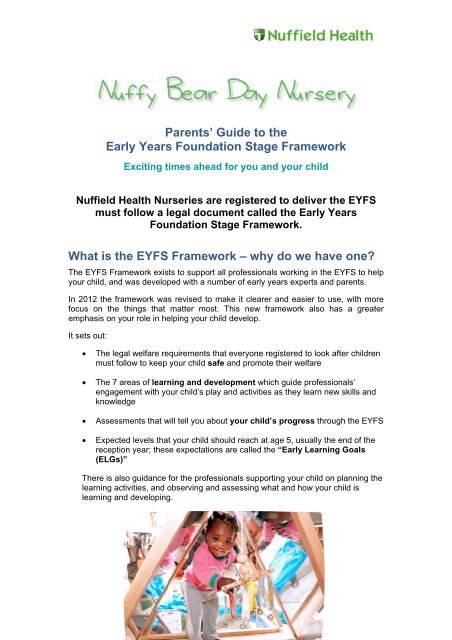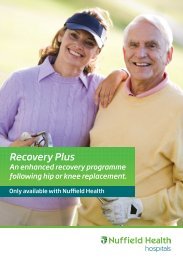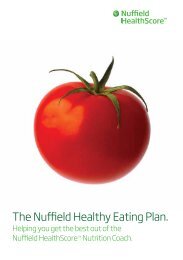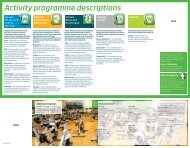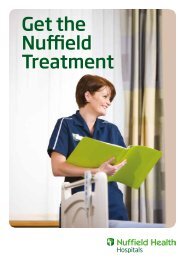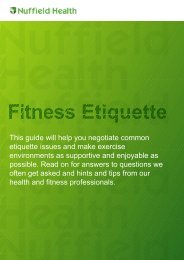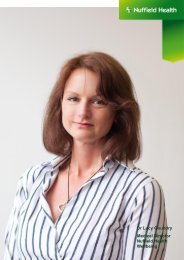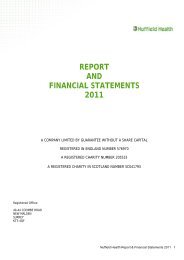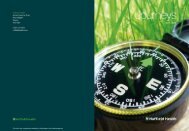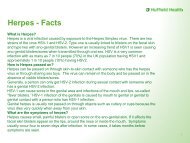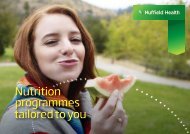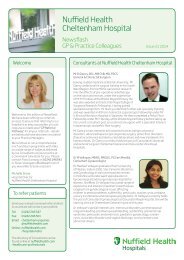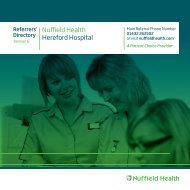Parents' Guide to the Early Years Foundation Stage ... - Nuffield Health
Parents' Guide to the Early Years Foundation Stage ... - Nuffield Health
Parents' Guide to the Early Years Foundation Stage ... - Nuffield Health
Create successful ePaper yourself
Turn your PDF publications into a flip-book with our unique Google optimized e-Paper software.
Parents’ <strong>Guide</strong> <strong>to</strong> <strong>the</strong><strong>Early</strong> <strong>Years</strong> <strong>Foundation</strong> <strong>Stage</strong> FrameworkExciting times ahead for you and your child<strong>Nuffield</strong> <strong>Health</strong> Nurseries are registered <strong>to</strong> deliver <strong>the</strong> EYFSmust follow a legal document called <strong>the</strong> <strong>Early</strong> <strong>Years</strong><strong>Foundation</strong> <strong>Stage</strong> Framework.What is <strong>the</strong> EYFS Framework – why do we have one?The EYFS Framework exists <strong>to</strong> support all professionals working in <strong>the</strong> EYFS <strong>to</strong> helpyour child, and was developed with a number of early years experts and parents.In 2012 <strong>the</strong> framework was revised <strong>to</strong> make it clearer and easier <strong>to</strong> use, with morefocus on <strong>the</strong> things that matter most. This new framework also has a greateremphasis on your role in helping your child develop.It sets out:The legal welfare requirements that everyone registered <strong>to</strong> look after childrenmust follow <strong>to</strong> keep your child safe and promote <strong>the</strong>ir welfareThe 7 areas of learning and development which guide professionals’engagement with your child’s play and activities as <strong>the</strong>y learn new skills andknowledgeAssessments that will tell you about your child’s progress through <strong>the</strong> EYFSExpected levels that your child should reach at age 5, usually <strong>the</strong> end of <strong>the</strong>reception year; <strong>the</strong>se expectations are called <strong>the</strong> “<strong>Early</strong> Learning Goals(ELGs)”There is also guidance for <strong>the</strong> professionals supporting your child on planning <strong>the</strong>learning activities, and observing and assessing what and how your child islearning and developing.
What does it mean for me as a parent?Ensuring my child’s safetyMuch thought has been given <strong>to</strong> making sure that your child is as safe as possible.Within <strong>the</strong> EYFS <strong>the</strong>re is a set of welfare standards that everyone must follow. Theseinclude <strong>the</strong> numbers of staff required in a nursery, how many children a childmindercan look after, and things like administering medicines and carrying out riskassessments.QualityYou can find out about <strong>the</strong> quality of your child’s nursery and o<strong>the</strong>r early yearsproviders in relation <strong>to</strong> <strong>the</strong> EYFS Framework by checking what <strong>the</strong> Government’sofficial inspection body for early years, Ofsted,has <strong>to</strong> say about it. You can find thisinformation at www.ofsted.gov.uk/inspection-reports/find-inspection-report.How my child will be learningThe EYFS Framework explains how and what your child will be learning <strong>to</strong> support<strong>the</strong>ir healthy development.Your child will be learning skills, acquiring new knowledge and demonstrating <strong>the</strong>irunderstanding through 7 areas of learning and development.Children should mostly develop <strong>the</strong> 3 prime areas first. These are:Communication and language;Physical development; andPersonal, social and emotional development.These prime areas are those most essential for your child’s healthy development andfuture learning.As children grow, <strong>the</strong> prime areas will help <strong>the</strong>m <strong>to</strong> develop skills in 4 specific areas.These are:Literacy;Ma<strong>the</strong>matics;Understanding <strong>the</strong> worldExpressive arts and design.These 7 areas are used <strong>to</strong> plan your child’s learning and activities. The professionals
teaching and supporting your child will make sure that <strong>the</strong> activities are suited <strong>to</strong> yourchild’s unique needs. This is a little bit like a curriculum in primary and secondaryschools, but it's suitable for very young children, and it's designed <strong>to</strong> be really flexibleso that staff can follow your child's unique needs and interests.Children in <strong>the</strong> EYFS learn by playing and exploring, being active, and throughcreative and critical thinking which takes place both indoors and outside.
As a mum or dad, how can I help with my child’slearning?All <strong>the</strong> fun activities that you do with your child at home are important in supporting<strong>the</strong>ir learning and development, and have a really long lasting effect on your child’slearning as <strong>the</strong>y progress through school.Even when your child is very young and is not yet able <strong>to</strong> talk, talking <strong>to</strong> <strong>the</strong>m helps<strong>the</strong>m <strong>to</strong> learn and understand new words and ideas. If you make <strong>the</strong> time every day<strong>to</strong> do some of <strong>the</strong> following things with your child it will make a real difference <strong>to</strong> yourchild’s confidence as a young learner.Sing and tellnurseryrhymesTalk about <strong>the</strong> numbers,colours, words and letters yousee when you are out andaboutAllow your child <strong>to</strong> cu<strong>to</strong>ut and stick picturesfrom magazinesOn a trip <strong>to</strong> <strong>the</strong>supermarket, talkabout all <strong>the</strong>differentpackaging shapesCook / bake<strong>to</strong>ge<strong>the</strong>rPlant seeds or bulbs ina pot or garden patchTalk <strong>to</strong> your child atevery opportunity –e.g. what you aredoing that dayUse <strong>the</strong> wea<strong>the</strong>r – shadows, rainpuddles, snow, wind, mist and sun– <strong>to</strong> extend your child’s vocabularyShare abookExplore <strong>the</strong> park at adifferent time of <strong>the</strong>year – go off <strong>the</strong>beaten trackIf you're looking for new ideas for things <strong>to</strong> do <strong>the</strong>n find out what is on offer at yourlocal children’s centre. Many offer ‘messy play’ activities which you and your childcan join in with, and many of <strong>the</strong> activities <strong>the</strong>y provide are free. Staff can also giveyou advice about <strong>the</strong> kinds of books or o<strong>the</strong>r activities your child might enjoy atdifferent ages.
How can I find out how my child is getting on?It is important that you and <strong>the</strong> professionals caring for your child work <strong>to</strong>ge<strong>the</strong>r. Youneed <strong>to</strong> feel comfortable about exchanging information and discussing things that willbenefit your child. These conversations will ei<strong>the</strong>r need <strong>to</strong> be with your childminderor, in a larger setting like a nursery, with your child’s “key person”. This is <strong>the</strong>person who:Is your main point of contact within <strong>the</strong> settingHelps your child <strong>to</strong> become settled, happy and safeIs responsible for your child’s care, development and learningTakes a careful note of your child’s progress, sharing this with you and givingyou ideas as <strong>to</strong> how <strong>to</strong> help your child at homeYou should be able <strong>to</strong> get information about your child’s development at anytime and <strong>the</strong>re are two stages (at age 2, and again at age 5) when <strong>the</strong>professionals caring for your child must give you written information abouthow he or she is doing.Try <strong>to</strong> speak <strong>to</strong> your child’s key person asoften as possible about what your child hasbeen doing, what <strong>the</strong>y have enjoyed, what<strong>the</strong>y need <strong>to</strong> be doing more of and what youcan do at home.
When your child is 2At some point after your child turns 2, <strong>the</strong> professionals working with yourchild must give you a written summary of how your child is progressingagainst <strong>the</strong> 3 prime areas of learning:communication and language;physical development; andpersonal, social and emotional development.This is called <strong>the</strong> progress check at age 2.This check will highlight areas where your child is progressing well and anywhere <strong>the</strong>y might need some extra help or support – and how mums and dadsand o<strong>the</strong>r family members or carers can work with <strong>the</strong> key person <strong>to</strong> help. Youmight find it useful <strong>to</strong> share <strong>the</strong> information from <strong>the</strong> check with o<strong>the</strong>rprofessionals such as health visi<strong>to</strong>rs (who can use it as part of <strong>the</strong> health anddevelopment review).When your child is 5At <strong>the</strong> end of <strong>the</strong> EYFS – in <strong>the</strong> summer term of <strong>the</strong> reception year in school –teachers complete an assessment which is known as <strong>the</strong> EYFS Profile. Thisassessment is carried out by <strong>the</strong> reception teacher and is based on what <strong>the</strong>y, ando<strong>the</strong>r staff caring for your child, have observed over a period of time.Ano<strong>the</strong>r important part of <strong>the</strong> EYFS Profile is your knowledge about your child’slearning and development, so do let your child’s class teacher know about what yourchild does with you: such as how confident your child is in writing <strong>the</strong>ir name, reading
and talking about a favourite book, speaking <strong>to</strong> people your child is not so familiarwith or <strong>the</strong>ir understanding of numbers.All of <strong>the</strong> information collected is used <strong>to</strong> judge how your child is doing in <strong>the</strong> 7 areasof learning and development. Finding out at this stage how your child is doing willmean that <strong>the</strong> teacher your child has in <strong>the</strong>ir next school year – year 1 – will knowwhat your child really enjoys doing and does well, as well as helping <strong>the</strong>m decide ifyour child needs a bit of extra support, what that support should be and if <strong>the</strong>y arealready getting it.The school will give you a report of your child’s progress, including information fromhis or her EYFS Profile.Where can I go for fur<strong>the</strong>r information?The most important place <strong>to</strong> find out more is your child’s childminder or nursery –do ask as many questions as you need <strong>to</strong>. Providers really do welcome speakingwith you.You may want <strong>to</strong> find out what is on offer at your local children’s centre.You can find <strong>the</strong> <strong>Early</strong> <strong>Years</strong> <strong>Foundation</strong> <strong>Stage</strong> which includes <strong>the</strong> early learninggoals at www.foundationyears.org.uk. The foundation years website also includes arange of resources and contacts.© Crown copyright 2012You may re-use this information (excluding logos) free of charge in any format or medium, under <strong>the</strong> terms of <strong>the</strong>Open Government Licence. To view this licence, visit http://www.nationalarchives.gov.uk/doc/open-governmentlicence/or e-mail: psi@nationalarchives.gsi.gov.uk. Where we have identified any third party copyright informationyou will need <strong>to</strong> obtain permission from <strong>the</strong>


